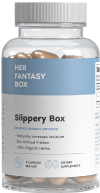Listen up, Fantasy Baes! Menopause is a natural transition, but it doesn’t get talked about enough. It marks the end of the reproductive years and can bring a mix of changes—one commonly discussed topic is vaginal dryness. This post explains what’s going on and offers practical, non-medical tips for comfort during this phase.
Understanding Vaginal Dryness During Menopause
Many people in menopause report vaginal dryness. If dryness is affecting your day-to-day, it’s worth discussing with your healthcare provider. When dryness appears with other changes—like itching, burning, or discomfort with intimacy—your clinician can help evaluate for Genitourinary Syndrome of Menopause (GSM) and suggest options that fit your health history. 2
Why Dryness Can Happen
During menopause, estrogen levels decline. The tissues in and around the vagina can become thinner and less elastic, which may feel drier or more easily irritated. 1
Common Experiences
People often describe itching, burning, soreness, or discomfort with sex. These changes can affect comfort, confidence, and intimacy. If you’re unsure what’s typical for you, check in with your clinician. 1
Clinician-Guided Options
Some individuals work with their healthcare provider on prescription approaches (for example, vaginal estrogen products). Whether any option is right for you depends on your health profile—your clinician is the best source of guidance. 3
At-Home Comfort Measures (Non-Medical)
- Lubricants for intimacy: Water-, oil-, or silicone-based lubricants can add glide during sex. Apply to the vulva/vagina and any partner’s skin or toy as needed. 2
- Vaginal moisturizers: Used on a regular schedule (separate from sex) to help maintain surface hydration. 1
- Slippery Box: Our Slippery Box Moisture Capsules feature slippery elm and are an oral, plant-based supplement some adults include in a daily routine for general hydration support. Individual experiences vary; consult your clinician if you have questions.
Day-to-Day Habits That May Help
- Movement, rest, and stress care: Regular activity, sleep routines, and stress-management practices can support overall well-being. 3
- Pelvic floor exercises: Many people find these helpful for comfort and body awareness.
- Regular sexual activity (solo or partnered): Can support blood flow and comfort for some.
- Tobacco alternatives: If you smoke, talk with your clinician about support to quit.
Gentle Cleansing & Body Care
- Use mild, fragrance-free cleansers: Choose gentle products and avoid douching or strong fragrances that may irritate. Try our Refresh Plant-Based Intimate Body Wash (a gentle, everyday cleanser) or Yummy Vegan Body Wash for an all-over routine. Always follow label directions.
- Avoid potential irritants: If something stings or causes redness, discontinue use and check with your clinician.
Real Reviews, Real Customers
When to Seek Medical Care
- Get personalized guidance: Persistent dryness or GSM-like symptoms deserve a professional evaluation and tailored plan.
- Rule out other conditions: A clinician can assess for other causes and recommend next steps.
Talking openly about dryness is a smart, self-respecting move. With the right information, simple routine shifts, and clinical guidance when needed, you can find a comfortable routine through menopause.
References
- “Current treatment options for postmenopausal vaginal atrophy.” 2018. NCBI. Link.
- “Don’t ignore vaginal dryness and pain.” 2021. Harvard Health. Link.
- “Genitourinary Syndrome of Menopause (GSM).” Brigham and Women’s Hospital. Link.
For general information only; not a substitute for professional medical advice, diagnosis, or treatment. Products mentioned are cosmetic or general-wellness items and are not intended to diagnose, treat, cure, or prevent any disease. Always follow product labels and consult your healthcare provider. Individual experiences vary.










